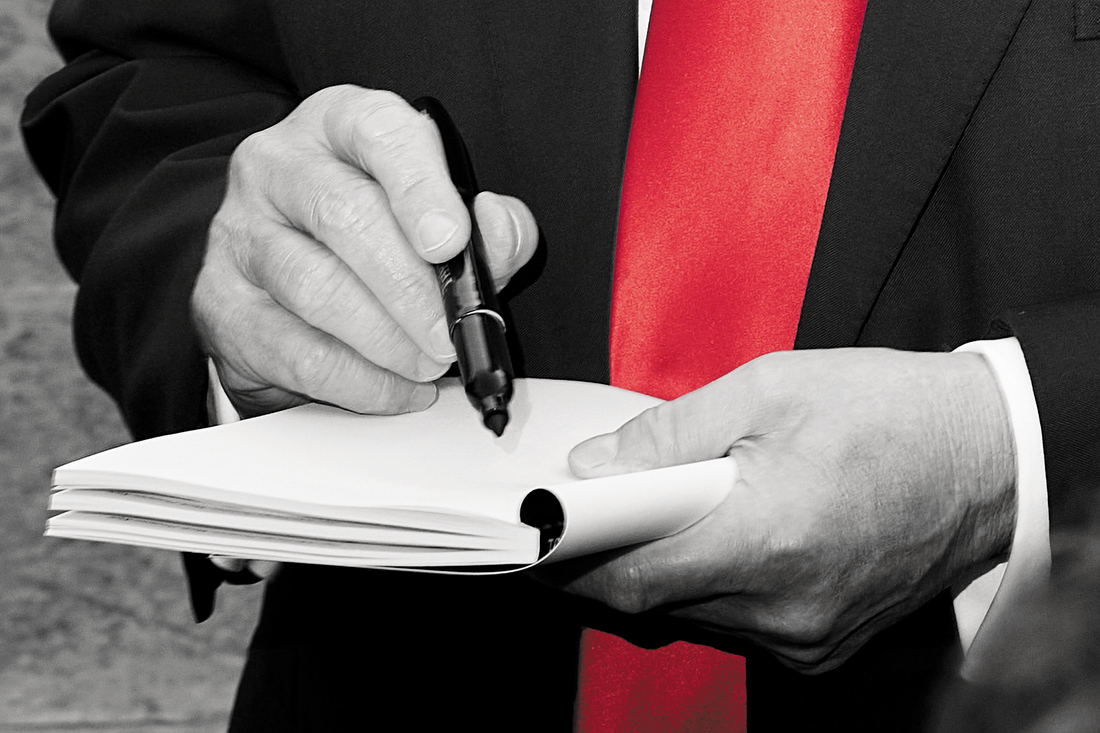
This article was featured in One Great Story, New York’s reading recommendation newsletter. Sign up here to get it nightly.
They say anger is a secondary emotion,” someone who has much to fear from the incoming administration told me last week. “So whatever’s under that is …” He paused. He had, throughout our conversation, veered relentlessly toward the general, away from the intensity of his experience. “Whether it’s fear, some sense of injustice, or a need being deprived, it’s hard.” The man for whom it is hard is a straitlaced middle-aged former official who spent decades working in government, a small percentage of that time having been devoted to national-security and legal concerns surrounding Donald Trump. He was an insider until he wasn’t.
“People aren’t thinking creatively enough,” Andrew McCabe told Politico in September, “about this whole idea of the revenge tour.” The notion that this might be a productive civic assignment — think creatively about revenge tour — is still new to most of us, but it was not new to McCabe, who had himself been targeted; it was not new to the Insider; and it was not new to people on what has come to be called, with alarming alacrity, “the enemies list.”
There is the list, and there is the list. The enemies list in broad circulation is an Excel file with more than 200 names organized by offense (“RINO,” “Trump Impeachment,” “Afghanistan Withdrawal”) compiled by Ivan Raiklin, a former Green Beret who calls himself Trump’s “secretary of retribution.” This list may well be Raiklin’s personal fever dream, though just as successful cults transform imperceptibly into religions, entrepreneurial brinksmen may one day be institutional actors. The actual list, the list of greater concern, is the running list in Trump’s head: his obsessions, the people of whom he was no doubt thinking when he told Dr. Phil that “revenge does take time.”
The Insider is on the second list. On the afternoon of November 5, he was hopeful that the country would not elect the man who had vowed, repeatedly, to imprison his political opponents. “I did think it seemed like Harris had a tremendous amount of momentum,” he said. “It seemed like Trump was mailing it in.” He turned on the results once in the early evening and saw it was close. “I was like, All right, I’m not going to drive myself crazy by watching this. And so I turned off the television.”
When he woke up in the middle of the night, checked his phone, and saw where all of this was going, he had trouble falling back asleep. The Insider is dispiritingly familiar with the machinery available to a president intent on revenge. He wondered whether Trump would go after shiny new objects (pollsters he’s mad at) or, in his senescence, return to “formative memories,” old hatreds, the Clintons, the Biden Crime Family, the Insider himself. He worried it was the latter.
The Insider might be charged with a spurious crime and placed in prison. Should he leave the country? He knew that fleeing the government that issues your passport was not like exiting a bad marriage. “Who has extradition or not?” he asked. “Which nations would take you? If it gets bad, and all of a sudden tens of thousands or more of Americans are just trying to leave because they don’t feel safe anymore, do you overwhelm those immigration processes? Is money safe in U.S. institutions or not?”
In May and June, the Insider joined dozens of others at a hotel in Alexandria, Virginia, to game out the possibilities an authoritarian White House might unleash on the rest of us. The war games were sponsored by NYU Law’s Brennan Center for Justice. There was a large table, a microphone, a 20-sided die, a game master. The players were former governors, former House members, former Cabinet officers, and executives; people familiar with certain boundaries or the lack of them. The person playing the president would try to do things Trump had said he wanted to do, and other people would consider ways of stopping him. The fake president might invoke the Insurrection Act. Opposing players might file a court challenge. A role of the die would determine how many people showed up to protest.
The Insider was thus present as lawyers and former governors tried to cope with a president intent on punishing institutions and individuals. They found little recourse for false charges levied against innocent people. A career prosecutor who objected could be replaced.
The Insider thought the war games were “extraordinarily productive” but also, even given outcomes organizer Barton Gellman calls “uniformly sobering,” too optimistic. They took place before the Supreme Court’s immunity ruling. The games were played largely among lawyers, who tend toward self-flattering belief in the efficacy of law. “Why is it,” he asked me, “you think Trump will listen to anything a court says? At the end of the day, the coercive power of the state reports to the president.”
The Insider was not the only one at the Alexandria hotel for whom the games felt personally relevant. There was, seated at the table, another middle-aged man, an intellectual, also fodder for right-wing fantasia. He has heard himself named by Glenn Beck and Ted Cruz. Once, someone sent a bullet to his office. He is not one of Trump’s personal obsessions, he is not the Insider, but “when you look at the authoritarian playbook in other countries, it’s not necessarily the people at the top of the list who get selected to go first to the wall.” A softer target offers less resistance. “And if the government starts to prosecute me, nobody knows who I am except for my friends. And so when there’s this sort of page-8 story about this guy getting prosecuted, Well, who knows what he did, and maybe he deserves it.”
He might be investigated by the DOJ on absurd charges (as was John Kerry) or forced to come before a special counsel (as was Hillary Clinton). He might be subject to an invasive, expensive investigation by the IRS (as James Comey was, though after a yearlong audit, the agency could conclude only that he had overpaid and refunded him $347). Short of arrest and incarceration, he fears the financial and emotional costs of investigation, the lawyers and subpoenas and emails: the process as punishment. Some Trump-era investigations were eventually stopped by people who refused to pursue them, the kind of people Trump has promised to purge.
Among the knowledge shared during the war games: Just as anyone can be deemed an enemy combatant, anyone can be deputized as a U.S. Marshal. The Insider doesn’t think Trump can corrupt intransigent bureaucracies like the FBI, but he thinks men outside of these institutions, prone to violence, may come for his family and go unpunished. Or what if: As the administration builds detention centers and rounds up undocumented immigrants, it hands over a list of a couple hundred seditionists? “Add them to your list and grab them, too. Is it illegal? Yeah, who’s going to investigate it?”
The Insider is waiting. The Intellectual is leaving. The chance is too high that a Trump White House would bankrupt him with endless investigations. Some of his money is safely abroad. He will be out of the country before the inauguration, working remotely. He’ll wait things out from a distance, away from his children. He would do it all again. “I’m the guy who has a lot of privileges in my life,” he said, “and I don’t feel ashamed of my privileges, but I feel like I got to use my privileges for something other than going snowboarding.”
Both men have, through recent experience, adopted an extreme epistemic humility. You may live most of your life in what you take to be the actual world, and find yourself suddenly a villain in someone else’s idea of the same. You may carry on extrapolating the future from the past until one day this method fails. “We’re all thinking as products of growing up in the United States as it existed,” said the Insider. “We are all prisoners of our own prism into reality.” People keep asking the Intellectual, “But when you go abroad, what will you be waiting for? What would keep you away, or bring you back?” He doesn’t know. He won’t deign to predict. “I bought a round-trip ticket,” he told me, “but only because it was cheaper.”






























